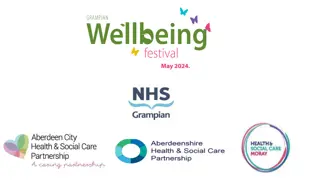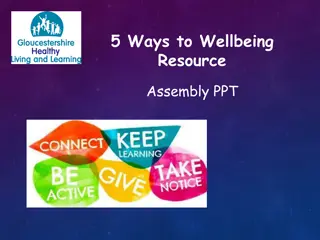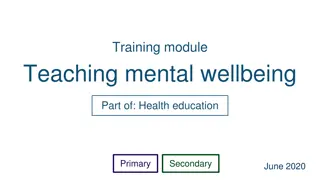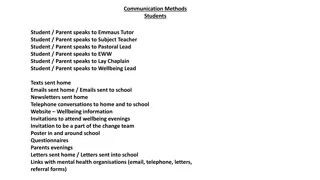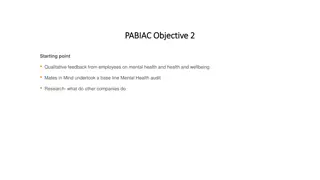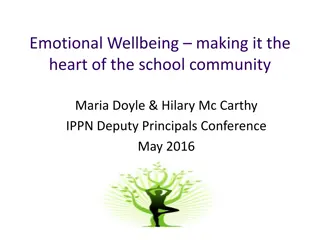Promoting Wellbeing in Schools: Strategies and Tools for Mental Health
Explore the Six Ways to Wellbeing initiative by Kent School Health, focusing on mental health support through resources like the Wheel of Wellbeing. Understand the importance of wellbeing, how to manage stress, and cope with anxiety. Learn about the impact on mental health and ways to create a supportive environment in schools.
Download Presentation

Please find below an Image/Link to download the presentation.
The content on the website is provided AS IS for your information and personal use only. It may not be sold, licensed, or shared on other websites without obtaining consent from the author. Download presentation by click this link. If you encounter any issues during the download, it is possible that the publisher has removed the file from their server.
E N D
Presentation Transcript
Six Ways to Wellbeing Whole School Health Team Kent School Health
Six Ways to Wellbeing Staying well and managing stress Wheel of Wellbeing is owned by South London and Maudsley NHS Foundation Trust (SLaM) and is licensed under a Creative Commons Attribution Non-Commercial Share-Alike 4.0 International License. Information on this license is available at www.creativecommons.org/licenses/by-nc-sa/4.0. Adaptations need to follow brand guidelines available at www.wheelofwellbeing.org and be signed off by SLaM. For permissions beyond the scope of this license contact hello@wheelofwellbeing.org.
Ground rules Voluntary participation - we hope for good discussion but you do not have to say anything if you do not wish to We want to hear all contributions - even if it is an unusual point of view Respect - listen to others opinions Be non judgemental Everything said is treated as confidential Look after yourself and others - access support through your teachers and colleagues if needed.
Objectives to understand what affects your wellbeing. By identifying the things that make you feel good, you can support yourself when times are hard to explore ways to cope in times of change or stress to explore how anxiety feels to identify our support systems and how we can support others.
What is wellbeing? If you have good mental wellbeing (or good mental health), you are able to: feel confident in yourself feel and express a range of emotions feel engaged with the world around you live and work productively cope with the stresses of daily life and manage times of change and uncertainty.
What can impact on wellbeing? We all have times when we feel sad or stressed, or find it difficult to cope. For example if we: suffer some sort of loss times of change i.e. moving school, moving house feel isolated/alone experience friendship/relationships problems worry about school, work or money.
Is anxiety normal? YES! Anxiety is a normal response to stress or danger and is often called the flight or fight response. This process involves adrenalin being quickly pumped through the body enabling it to cope with whatever catastrophe may come its way. Anxiety only becomes problematic when our anxious/stressed out response is out of proportion, if it continues even after the event that we found stressful is over, or if it is stopping us from doing day to day things.
Dealing with anxiety and stress What signs might you notice when your stress levels rise? What might other people notice? What can others do to help you if they notice or you tell them you are stressed? What can you do to help yourself?
Exercise Appreciate nature Go for a walk Practice relaxation Take 10 minutes for yourself Talk about things Visit friends/family Keep in contact Support networks Set boundaries Managing stress Listen to music Take part in hobbies/interests Be creative Learn new things Help others Eat well Get enough sleep Have a relaxing bath Take regular breaks
Listen to what youre saying to yourself - we dont always consciously take note of what we re saying in our minds. Take some time each day to listen, and even write down what you re thinking. Monitor your self-talk - is your self-talk more positive or negative? Change your self-talk - Try switching your negative thoughts to positive ones. For example, if you think I ll never be able to do this , ask yourself - is there anything I can do that will help me be able to do this?
Six ways to wellbeing Be Active Be active - Go for a walk or run. Step outside. Play a game. Garden. Dance. Exercising makes you feel good. Discover a physical activity that you enjoy. Keep Learning Keep learning - Try something new. Rediscover an old interest. Sign up for a course. Learning new things will make you more confident, as well as being fun. Give - Do something nice for a friend or stranger. Smile. Volunteer your time. See yourself, and your happiness, linked to the wider community it s rewarding. Give Connect Connect - with the people around you. With family, friends, colleagues and neighbours. At home, work, school or in your local community. Take Notice Take notice - Be curious. Catch sight of the beautiful. Remark on the unusual. Savour the moment. Be aware of the world around you and what you are feeling. Grow Your World Carefor the planet - Make small changes to your life that will reduce your energy use, recycle more, walk to school. 14
General tips for wellbeing Eat right - eat fresh fruit and veg and have a proper breakfast. Fuel your brain as well as your body - no one can think straight on coffee and chocolate. Sleep well - wind down before bed and don't revise under the duvet - your bed is a sanctuary, not a desk. Get your eight hours. Exercise - nothing de-stresses the mind faster than physical activity, so build it into your timetable.
Managing anxiety top tips Learn to recognise when you're stressing out. A break or a chat with someone who knows the pressure you're under will get things into perspective. Avoid comparing your abilities with your friends. Make a realistic timetable and stick to it build in times for breaks alongside work.
During and after exams Get an early night and eat breakfast on the morning of the exam. Panic is often triggered by hyperventilating (quick, shallow breaths). So if you feel yourself losing it during the exam, sit back for a moment and control your breathing. Take a deep breath in and out through the nose, counting to five each way. Steer clear of any exam 'post-mortem'. It doesn't matter what your mate wrote for question 3(b), it's too late to go back and change your answers, so it will just make you worry even more.
Additional support Student support services Kent School Health team Student counsellor Youth worker Family and friends Online resources GP
Useful websites AnxietyUK Helplines, email support, live chats and therapy services for people with anxiety disorders. http://www.anxietyuk.org.uk/ https://www.anxietyuk.org.uk/blog/anxiety-uks-top-tips-for-managing-exam-stress/ C.A.L.M C.A.L.M (campaign against living miserably) is a charity dedicated to preventing male suicide. They have lots of information on their website and run a helpline from five to midnight. http://www.thecalmzone.net/ Mind Advice and support to people with mental health problems. Their helpline runs 9am to 6pm from Monday to Friday. http://www.mind.org.uk/ Live Well https://livewellkent.org.uk/






